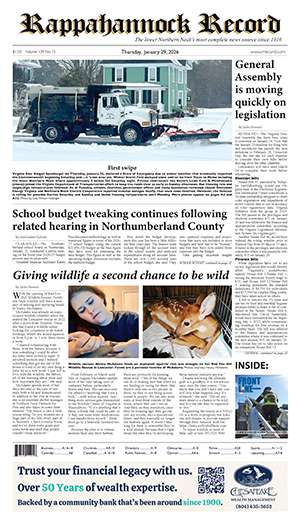From 1945 to 1952, Alexander Wetmore served as secretary of the Smithsonian Institution in Washington. His field was ornithology, in which he was recognized as one of the world’s leading authorities on birdlife, especially that found in the mountains of Central America. After his retirement, he kept a small office in one of the towers of the original Smithsonian building, where he continued his research until his death at 92 in 1978.
Dr. Wetmore had one child, a daughter, Margaret, known as Peg, who married Jack Harlan, an attorney whose last position after retirement from government service was as president of Engelhard Industries. His father had been the government lawyer who negotiated the legal aspects of the carving of Mount Rushmore between President Franklin Roosevelt and sculptor Gutzon Borglum, who constantly complained that the available funds were inadequate for him to complete the project.
In her career, Peg served as a consultant to the secretary of labor on the implementation of standards for the employment of women in the work force. She was a sought-after speaker on the subject in the Washington area and a popular hostess among the Capital’s glitterati.
In retirement, the younger Harlans moved to Gloucester County, where they were joined by John Harlan Sr. They named their property, “Locust Point.” It consisted of a large tract of land on the Ware River, with an imposing driveway leading up to the mid-century modern house, the site of which commanded the lower course of the river.
In 1990, Jack Harlan died at 71, to be followed three years later by his father at 98, leaving Peg alone on their extensive property. Her home was a museum, containing many of her parents’ books and personal artifacts, including her mother’s button collection consisting of thousands of antique buttons, all neatly arranged and categorized.
Peg was an adventurous and industrious person. In “retirement” she channeled her energies towards making a success of the venerable country store at Naxera, which she bought in a state of disrepair. She brought the building back from the brink of collapse and opened an old-fashioned country general store.
The remote location was miles off of Route 17, and although she did not invent the proverbial mousetrap, she did find that the world, or at least that part of it in Gloucester and surrounding confines, would beat a path to her door for her selections of meats, drinks, vegetables, baked goods, “country” apparel, plants and gardening items, but she was most proud of her array of cheeses that she ordered from many venues, both near and far. She sold nothing that was run-of-the-mill.
The store was her life for over 10 years, and in that remote area, it became a significant part of the life of the community as well. She provided chairs and sitting space for patrons to relax and enjoy the ambience of being in a genuine replication of stores of years ago. Peg had graduated from Hood College in Frederick, Maryland, where she majored in home economics, textiles and costume design, all of which she put to good use in operating her country store.
As her birthdays mounted, and Jack’s health declined, she decided that she could not keep the store going, and, reluctantly, she closed her doors and sold the building, which did not reopen as a country store, in part because Peg was the store experience, as hers was a labor of love, without concern for making a profit.
After Jack’s death, she sold her large home and moved to a small cottage that they had built on the property as the residence for Jack’s boat captain, from the days when they cruised throughout the Chesapeake Bay and along the Atlantic Coast. There she lived until her death in 2000 at the age of 83. For her time in Virginia, Peg’s was a bright and glowing presence.







